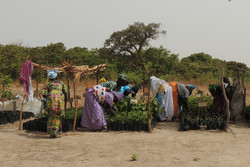Combating climate change and desertification in West Africa
Desertification and land degradation occur in arid, semi-arid and dry sub-humid areas and are driven by climatic variations and human activity. The result can be the degradation of soil and vegetation over billions of hectares of rangeland and cropland. The UNDESERT(opens in new window) (Understanding and combating desertification to mitigate its impact on ecosystem services) project was established to provide greater insight into desertification and land degradation, and their impacts on ecosystems. The aim was to combat desertification and land degradation in order to mitigate the impacts on ecosystem services and consequently on human livelihoods. This can set in motion a positive cycle that can contribute to alleviating poverty and generate benefits at the community level in accordance with the United Nation’s Millennium Development Goals. Researchers took an interdisciplinary approach, using remote sensing data with vegetation, soil and socioeconomic information for application in novel computer modelling techniques. They worked with local stakeholders to assess the impact of desertification and to ensure successful implementation of sustainable management practices. In addition, the consortium developed decision-support tools and best practice guidelines for natural resource managers based on early warning indicators of environmental degradation. Risk assessments were conducted in six different case studies on a national and a local scale to investigate the effect of land use and climate change on plant species distribution and diversity patterns. Results showed that both land use and climate pose high risks for plant species distribution and diversity patterns. In addition, climate and land-use changes are a serious risk for the diversity of food species. The consortium employed 17 African PhD students who received training to implement the project's work and help mitigate risks from future demographic and climatic changes. Results will be directly transferred to international programmes in order to support strategies and initiatives. UNDESERT will help mitigate climate change through increased carbon sequestration. It also provides better scientific understanding of reliable indicators thereby helping policymakers to formulate concrete management interventions for mitigating desertification. In addition, the project will improve the lives of local people and support capacity building through the close collaboration of scientists and stakeholders. The project’s video(opens in new window) is online.







